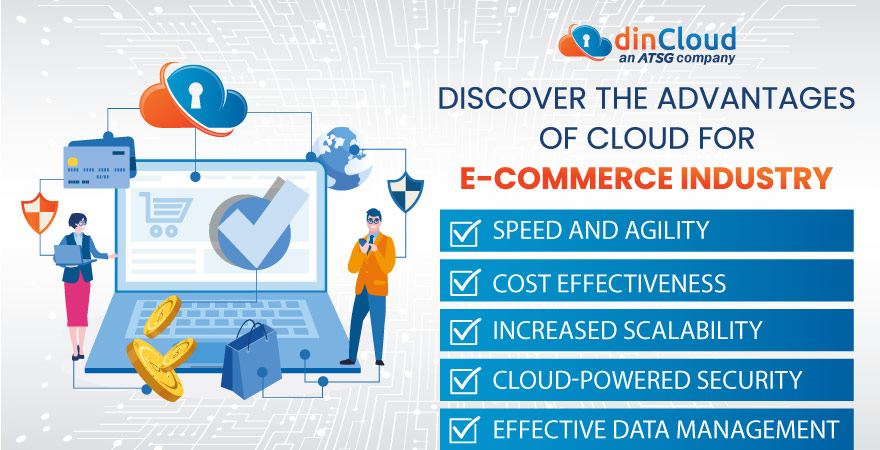Cloud Computing and E-commerce are massive industries in themselves. The intersection of both these digital worlds gives us the “E-commerce Cloud”. This combo is moving forward with the speed of light, towards domination in the business world. Promising statistics encourage businesses to “shop” for Cloud technologies, particularly for E-commerce websites.
The trend of online shopping was growing, even before the pandemic struck. However, the Covid19 outbreak acted as a catalyst for this industry, and resulted in unprecedented spikes in online shopping trends across the globe.
Cloud-based servers can fulfil multiple use cases for the digital presence of businesses, as they can optimize their websites in accordance with their requirements. This is generally not the case with on-premise solutions. Cloud infrastructures also ensure increased availability of services, and much improved data security against cyberattacks.

Related: How Does Cloud Bursting Work and Its Pros n Cons?
The following points highlight the benefits of Cloud Computing for E-commerce websites that businesses can leverage in numerous ways.
Increased Scalability
High internet penetration rates across the globe, and the boom in smartphone usage have changed the way we shop today. Online E-commerce platforms have to function round the clock, to keep up with new consumer trends.
Enterprises that use Cloud based services and solutions can scale their online operations, up or down, depending on their requirements. Release of a new hyped products, intense marketing campaigns (Black Fridays, Christmas Offers, Cyber Mondays etc.), and multiple discount offers can spike the traffic on any E-commerce website.
Instant scalability is particularly important when it comes to E-commerce websites, as there are frequent, and sometimes even un-predictable fluctuations in their website’s traffic.
Related: Why Should the Retail Sector Move to Cloud Computing?
Furthermore, it is extremely in-convenient for many businesses to develop or purchase an entire IT infrastructure, to keep up with customer’s un-predictable demands. This is why most of the businesses deploy Cloud-based services and solutions for their E-commerce websites, as it gives them much improved immunity against seasonal and event triggered shopping trends
The scalable and agile Cloud solutions by CSPs can adapt to spikes on the websites of E-Commerce companies, and ensure a smooth running of their operations.
Cost Effectiveness
Choosing the right CSP can not only help in scalability, but also aid in the reduction of the overall cost. By opting for Cloud-based solutions, enterprises only have to pay higher bills when there is actually heavy traffic on their website. Later on, when the E-commerce website traffic and resource usage is lower, they do not have to pay for the additional cloud-based services. The very convenient pay-as-you-go model, provided by most CSPs, enables enterprises to reduce their overall business cost and overheads.
Related: How to Improve Visibility in a Multi-Cloud Environment?
Auto-scaling parameters of Cloud-based operations also makes sure that you do not pay for un-used Cloud capacity. Multiple Cloud configurations can be leveraged and adjusted accordingly, to fulfil the unique needs of your E-commerce business. They can include memory, processing, performance or storage capacity.
Cloud-powered Security
Trust and security are extremely important pillars of the E-commerce business model. Customers expect the E-commerce websites to show an honest description of their product, deliver the right package, and keep their Personally Identifiable Information (PII), payment details, and confidential data protected and secure.
Another problem is that the cyber miscreants often choke E-commerce websites with a massive flood of internet traffic, with the intentions to block access of even the legitimate users. These are called Distributed Denial-of-Service (DDoS) attacks, and these can slow down, or even shutdown enterprise networks / systems.
Cloud Service Providers (CSP) offer services like Identity and Access Management (IAM), Zero Trust Network Access (ZTNA), and top-notch security for endpoint devices, to effectively tackle the cybersecurity risks lurking out there.
Related: How are Cloud Computing and Edge Networks Evolving?
Speed and Agility
The speed of an E-commerce website is of an instrumental value for the E-presence of an enterprise. Businesses that fail to optimize their websites can encounter huge revenue losses, and a tarnished market reputation.
Today, organizations cannot afford to lose time while manually preparing tedious lists of inventories sitting around at storage units and warehouses. The competition is so fierce that it is just a matter of a few minutes, or even seconds, before an enterprise starts losing its customers to competitors.
E-commerce websites that are backed by the right kind of Cloud hosted technologies, can deliver a seamless, extremely fast and agile user experience.
Related: Top Reasons Enterprises Will Continue to Adopt Cloud Desktops in 2022?
Effective Data Management
Cloud-based solutions allow E-commerce businesses to store data, record files and manage data storage across multiple locations. Large-scale Cloud Computing operations of CSPs allow effective organization of data, and offer automated solutions. Enterprise’s critical data can be stored on Cloud-based centralized repositories, and there would be decreased probability of human error.
CSPs, like dinCloud, provide Cloud Hosted Virtual Desktops (dinHVD) that can be leveraged by an enterprise’s staff for Customer Support Representatives (CSR). This will help them entertain customer questions, and provide 24/7/365 services from any location.
Conclusion
After the first wave of Covid-19, when business’s doors were shuttering, and shops were closing, the paralysis of movement shifted most consumer interactions to online platforms. All this made an already growing E-commerce space, the king.
Cloud Computing solutions were able to deliver better server usage, scalability, effective data management, and a robust cybersecurity posture for E-commerce businesses. The fact that it also reduced the overall cost, was like a “cherry on top”, since enterprises did not have to buy servers, or invest capital to install and configure complex on-premise IT infrastructures.
If you are looking to expand your business through E-commerce channels, now is the perfect time to engage a reliable Cloud Service Provider (CSP), like dinCloud, to propel you right beside the top players in the E-commerce industry.


